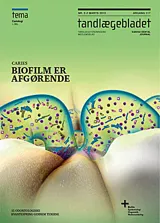COCHRANE-REVIEW: Aftepatienter skal behandles individuelt
Det er ikke muligt for Cochranes reviewere at kåre ”den optimale systemiske intervention”, når det gælder behandling af after. Det konkluderer de i et nyt review, som bygger på 25 studier af i alt 21 forskellige behandlingsmetoder.
Der var ikke én bestemt behandling, som var bedre end andre, men reviewet peger på, at kliniske erfaringer viser, at individuelle behandlinger ser ud til at hjælpe individuelle patienter.
Kommentar af lektor, ph.d. anne Marie lynge pedersen,
Tandlægeskolen i københavn:
– Recidiverende aftøs stomatitis (RAS) er en af de mest udbredte mundslimhindelidelser. Afterne er typisk 4-5 mm i diameter (minor after), men kan være op til 10 mm (major after). Sårene heler spontant i løbet af få dage til to uger. Udbrud optræder med varierende intervaller, fra uger til måneder. Afteudbruddene kan være så omfattende og smertefulde, at de vanskeliggør væske- og fødeindtagelse.
Årsagen til RAS kendes ikke, men en række lokale og almene faktorer antages at kunne disponere for udbrud af after. Endvidere optræder RAS ved forskellige systemiske sygdomme, bl.a. behcets sygdom, neutropeni, HIV og sygdomme i mave-tarm-kanalen.
Behandlingen er rettet mod at begrænse symptomerne, varigheden og omfanget af afteudbruddene samt mod behandling af eventuel tilgrundliggende almensygdom. Det aktuelle Cochrane-review fokuserer på systemisk behandling af RAS og omfatter studier, hvor der har været anvendt immunmodulerende/ antiinfl ammatorisk behandling samt anden behandling som Camel thorn, homøopati, Longovital (med og uden
vitaminer), propolis, doxycyclin, tetracyclin samt vitamin b-12. Det konkluderes, at der ikke kan dokumenteres en entydig effekt af de ovennævnte behandlinger, hvilket kan hænge sammen med uhensigtsmæssige forsøgsdesign, men også at antallet af randomiserede placebo-kontrollerede studier er utilstrækkeligt til at kunne belyse en mulig effekt. Cochranereviewet anerkender dog, at i klinisk praksis er individuel behandling nødvendig pga. stor variation i sværhedsgrad, varighed og recidivtendens samt forskelle i disponerende faktorer. Lokalbehandling bør forsøges før systemisk behandling med fx Prednison.
Tandlæger skal være opmærksomme på, at debut af hyppige og svære afteudbrud hos voksne og ældre personer kan være tegn på en tilgrundliggende almensygdom, der medfører immunsvækkelse
Abstract
Background
Recurrent aphthous stomatitis (RAS) is the most frequent form of oral ulceration, characterised by recurrent oral mucosal ulceration
in an otherwise healthy individual. At its worst RAS can cause significant difficulties in eating and drinking. Treatment is
primarily aimed at pain relief and the promotion of healing to reduce the duration of the disease or reduce the rate of recurrence.
A variety of topical and systemic therapies have been utilised.
Objectives
To determine the clinical effect of systemic interventions in the reduction of pain associated with RAS, a reduction in episode
duration or frequency.
Search methods
We undertook electronic searches of: Cochrane Oral Health Group and PaPaS Trials Registers (to 6 June 2012); CENTRAL via
The Cochrane Library (to Issue 4, 2012); MEDLINE via OVID (1950 to 6 June 2012); EMBASE via OVID (1980 to 6 June 2012);
CINAHL via EBSCO (1980 to 6 June 2012); and AMED via PubMed (1950 to 6 June 2012). We searched reference lists from
relevant articles and contacted the authors of eligible trials to identify further trials and obtain additional information.
Selection criteria
We included randomised controlled trials (RCTs) in which the primary outcome measures assess a reduction of pain associated
with RAS, a reduction in episode duration or a reduction in episode frequency. Trials were not restricted by outcome alone. We
also included RCTs of a cross-over design.
Data collection and analysis
Two review authors independently extracted data in duplicate. We contacted trial authors for details of randomisation, blindness
and withdrawals. We carried out risk of bias assessment on six domains. We followed The Cochrane Collaboration statistical
guidelines and risk ratio (RR) values were to be calculated using fixed-effect models (if two or three trials in each meta-analysis)
or random-effects models (if four or more trials in each meta-analysis).
Main results
A total of 25 trials were included, 22 of which were placebo controlled and eight made head-to-head comparisons (five trials
had more than two treatment arms). Twenty-one different interventions were assessed. The interventions were grouped into
two categories: immunomodulatory/anti-inflammatory and uncertain. Only one study was assessed as being at low risk of bias.
There was insufficient evidence to support or refute the use of any intervention.
Authors’ conclusions
No single treatment was found to be effective and therefore the results remain inconclusive in regard to the best systemic intervention
for RAS. This is likely to reflect the poor methodological rigour of trials, and lack of studies for certain drugs, rather
than the true effect of the intervention. It is also recognised that in clinical practice, individual drugs appear to work for individual
patients and so the interventions are likely to be complex in nature. In addition, it is acknowledged that systemic interventions
are often reserved for those patients who have been unresponsive to topical treatments, and therefore may represent a select
group of patients.
Brocklehurst P, TickleM, Glenny AM, LewisMA, PembertonMN, Taylor J,Walsh T, Riley P, Yates JM. Systemic interventions for recurrent aphthous
stomatitis (mouth ulcers). Cochrane Database of Systematic Reviews 2012, Issue 9. Art. No.: CD005411. DOI: 10.1002/14651858.CD005411.pub2.


